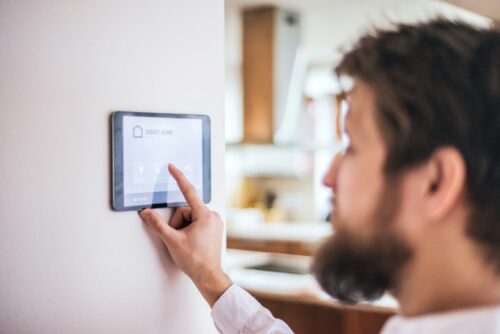The Future of Home Accessibility: Smart Home Technologies for Wheelchair Users in Ottawa

As society continues to evolve and technological advancements increase, we are constantly exploring new ways to improve accessibility and enhance the quality of life for individuals with disabilities. One of the most promising areas for innovation in this field is the integration of smart home technologies. By incorporating these advanced features into a home environment, we can provide wheelchair users with an unprecedented level of control, convenience, and independence.
In this article, we will discuss the latest smart home technologies that cater to the unique needs of wheelchair users in Ottawa, helping to create a more accessible and comfortable living environment. These innovative systems benefit individuals with mobility challenges and increase the overall functionality and value of a home. By embracing these advanced technologies, homeowners in Ottawa can ensure an accessible and accommodating living space that promotes independence and a higher quality of life for wheelchair users in 2024.
At Regional Ramp, we pride ourselves on staying at the forefront of innovations in accessibility solutions, working closely with industry leaders and technology experts to explore new ways of enhancing the lives of individuals with disabilities. By understanding the latest smart home technologies and their benefits, we strive to support our clients in Ottawa by offering state-of-the-art solutions and comprehensive expertise to create an accessible, inclusive, and thriving home environment. Join us as we delve into the exciting world of smart home technologies and discuss their potential impact on the lives of wheelchair users in Ottawa.
Smart Home Devices for Improved Accessibility
Various smart home devices are available in the market to simplify day-to-day tasks for wheelchair users, making their lives more comfortable and convenient. Here are a few widely used devices:
- Voice-activated assistants: Devices such as Amazon Echo or Google Home allow users to control home features using voice commands. Users can easily control lights and temperature and play music, among other tasks, without needing to operate switches or devices physically.
- Smart lighting systems: By installing smart bulbs and switches, individuals can control lighting levels and colours in their homes through voice commands or mobile apps. This helps them navigate the home without reaching for light switches.
- Smart thermostats: Maintaining a comfortable temperature is important for everyone, including wheelchair users. Smart thermostats allow easy and convenient control of heating and cooling systems, ensuring consistent comfort levels throughout the home.
- Robotic vacuum cleaners: Cleaning the house can be a challenge for wheelchair users. With advanced robotic vacuum cleaners, they can easily maintain cleanliness without having to navigate tricky spaces.
Innovative Home Automation Solutions for Accessibility
Home automation solutions have come a long way, offering great benefits to individuals with mobility challenges. Some of the most impressive technologies include:
- Automated door systems: These systems enable door operation through remote controls, voice commands, or mobile apps. With features like automatic opening and closing, wheelchair users can easily move in and out of rooms without assistance.
- Smart window blinds: Motorized and automated window blinds can be controlled with a smartphone app or voice commands, making it simple for wheelchair users to manage their home’s natural lighting.
- Video intercom and smart doorbell systems: Communication and security can be greatly improved with video intercoms and smart doorbells. These devices allow wheelchair users to see who is at the door, communicate with guests, and even grant or deny access without having to reach the door.
- Smart security systems: Ensuring a safe home environment is crucial, especially for those with mobility impairments. Installing smart security systems, such as cameras and motion sensors, offers greater peace of mind and control over home safety.
Adaptable Home Design for Wheelchair Users
As technology advances, the design of homes is also adapting to address the needs of individuals with disabilities. Wheelchair users can benefit from innovative design elements, such as:
- Adjustable countertops: Motorized adjustable countertops in kitchens and bathrooms enable wheelchair users to access sink and work areas comfortably, adapting to their specific requirements.
- Integrated lift systems: Installing integrated lifts in homes not only eases movement between floors for wheelchair users but also adds an aesthetically pleasing element to the home design.
- Customizable storage solutions: Wheelchair-accessible storage solutions, like adjustable cabinets and pull-down shelves, help wheelchair users access their belongings independently and comfortably.
- Accessible smart home control panels: Installing control panels at wheelchair-accessible heights enables users to manage and operate their smart home devices effortlessly.
Accessible Home Modifications for Integrating Smart Home Technologies
To fully embrace smart home technologies, homeowners in Ottawa may need to make certain modifications to their living spaces. Some essential steps include:
- Wide doorways: Ensuring that doorways, both interior and exterior, are wide enough to accommodate wheelchairs is crucial when integrating smart home technologies.
- Accessible power outlets: Installing power outlets at accessible heights allows wheelchair users to charge and operate smart devices without assistance.
- Cable management: Keeping cables and wires organized and concealed helps prevent tripping hazards, which is particularly important when introducing new smart home devices.
- Dedicated spaces for devices: Allocating specific spaces to house smart home devices ensures seamless integration within the home and helps maintain a clutter-free environment.
Conclusion
The integration of smart home technologies has the potential to significantly enhance the lives of wheelchair users in Ottawa, providing greater independence, convenience, and comfort. Investing in these innovative accessibility solutions not only increases the overall functionality of a home but also contributes to creating a more inclusive living environment. At Regional Ramp, we are dedicated to supporting our clients in their pursuit of improved accessibility and independence. Contact our team of experts to learn more about our wide range of accessibility solutions and how we can help you embrace the future of home accessibility in Ottawa in 2024.

